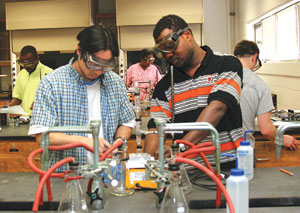Advertisement
Grab your lab coat. Let's get started
Welcome!
Welcome!
Create an account below to get 6 C&EN articles per month, receive newsletters and more - all free.
It seems this is your first time logging in online. Please enter the following information to continue.
As an ACS member you automatically get access to this site. All we need is few more details to create your reading experience.
Not you? Sign in with a different account.
Not you? Sign in with a different account.
ERROR 1
ERROR 1
ERROR 2
ERROR 2
ERROR 2
ERROR 2
ERROR 2
Password and Confirm password must match.
If you have an ACS member number, please enter it here so we can link this account to your membership. (optional)
ERROR 2
ACS values your privacy. By submitting your information, you are gaining access to C&EN and subscribing to our weekly newsletter. We use the information you provide to make your reading experience better, and we will never sell your data to third party members.
Education
Introduction: Roads Less Taken
by Corinne Marasco
September 3, 2007
| A version of this story appeared in
Volume 85, Issue 36
This year's education supplement sheds some light on the corners of education that haven't gotten much notice. It's a reminder that the highways we travel in life are rarely straight, and there's always something to be learned from trips along the back, side, and dirt roads.
First, Senior Correspondent Stu Borman introduces readers to fellows—faculty-like investigators who do independent research at academic institutions. It's a career option that is more common in biology, but does exist in chemistry. Fellowships are an opportunity to conduct productive research and have rewarding career experiences that aren't tied to a tenure-track position.
Next is a story about high school teachers who are using new tools such as podcasts, movies, electronic whiteboards, and online discussions in the classroom to enrich the learning experience for their students. Associate Web Content Editor Noah Shussett talks with teachers who have integrated technology into their curriculum in meaningful ways.
There are many wrong assumptions made about community colleges—for example, that they are primarily for students who can't succeed at a four-year institution and that the quality of the affordable education they offer is low. Assistant Editor Faith Hayden reports that the truth about community colleges flies in the face of these stereotypes. They are now attracting those who fit the typical four-year university profile and some offer their students solid science programs.
Finally, I ask former members of U.S. Chemistry Olympiad teams about their experiences and how their career decisions after the International Chemistry Olympiad were influenced as a result. Although only some of the students pursued a career in chemistry, all of them regarded the competition as a valuable and confidence-boosting experience.
- Introduction: Roads Less Taken
- This year's education supplement sheds some light on the corners of education that haven't gotten much notice.
- Fellows Are An Independent Lot
- Non-tenure-track research positions offer alternative career paths.
- Wired For Learning
- Teachers are tapping into youths' digital savvy to take science education into the future.
- Community Launch Pads
- Students find great value in low-cost, high-quality two-year colleges.
- Chemistry Olympians: Where are they now?
- Former team members reflect on the olympiad's lasting impact on their education and careers






Join the conversation
Contact the reporter
Submit a Letter to the Editor for publication
Engage with us on Twitter